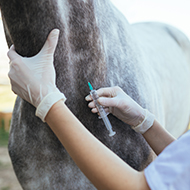BEVA monitoring shortage of equine influenza vaccinations

"If it becomes necessary, we will collectively work to devise practical solutions for dealing with any supply difficulties" - Jim Eyre, CEO of British Equestrian.
A collaboration between the British Equine Veterinary Association (BEVA), British Equestrian (BEF) and the British Horseracing Authority (BHA) has been set up to monitor interruptions to the supply of equine influenza vaccines.
Minor interruptions to the supply of vaccines have already been noted by the group, but a significant logistical issue faced by Boehringer Ingelheim has further raised the likelihood of a reduction in supplies in the months ahead.
The group is liaising with the three vaccine manufacturers to create solutions and minimise the impact of the shortage.
Chair of BEVA's Health and Medicines Committee, David Rendle said: “BEVA, BHA and the BEF will continue to work together with other industry and equestrian sporting bodies to manage the situation should the availability of influenza vaccines be compromised further.
“We remind all horse owners of the importance of maintaining vaccination for equine influenza but would advise they wait until as close a time as possible until their horse’s next dose is due to minimise current demand.”
Marc Laemmer, equine business head at Boehringer Ingelheim Animal Health, said: “We are currently experiencing a European-wide supply issue relating to our equine influenza and influenza-tetanus vaccines.
“This has been caused by unexpected issues following the implementation of a technology upgrade and is not a product or quality issue. This means that some vet practices will have difficulty obtaining sufficient influenza vaccines and there may be a shortage in the UK market.
“We understand the importance of these vaccines to equine welfare, and we are continuing to work tirelessly to find a solution so that we can return to normal supply as soon as possible.”



 The RCVS has announced a new version of its 1CPD mobile app, with enhanced features for veterinary surgeons and veterinary nurses to record their continuing professional development.
The RCVS has announced a new version of its 1CPD mobile app, with enhanced features for veterinary surgeons and veterinary nurses to record their continuing professional development.